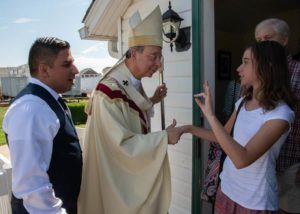According to Johns Hopkins researchers, there are more than 1.2 million Marylanders who are deaf or hard of hearing. What is the Catholic Church in the Archdiocese of Baltimore doing to reach that community? George Matysek talks about it with Christopher Duck, coordinator of deaf ministry in the archdiocese’s Office of Life, Justice and Peace. Duck is also a parishioner of Church of the Resurrection in Ellicott City.
Click play below to listen to the program. A complete transcript of the interview follows.
SEGMENT ONE
Matysek
Welcome to Catholic Review Radio. I’m George Matysek. According to Johns Hopkins researchers, there are more than 1.2 million Marylanders who are deaf or hard of hearing. What is the Catholic Church and the Archdiocese of Baltimore doing to reach this community? Joining us to talk about it today is Christopher Duck, coordinator of deaf ministry in the Archdiocese of Baltimore’s Office of Life, Justice and Peace. Chris is also a parishioner of Church of the Resurrection in Ellicott City.
Chris, thanks so much for being here on Catholic Review Radio.
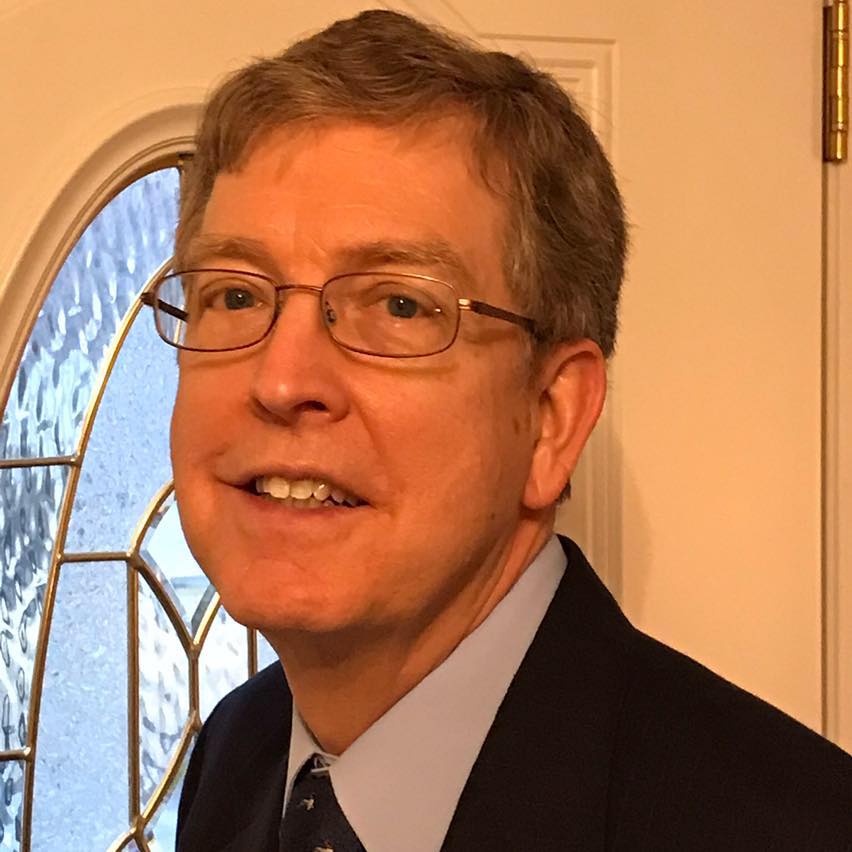
Duck
Well, thank you for having me, George.
Matysek
Maryland has one of the highest concentrations of deaf people in the country. Can you talk about that? Why are there so many people in that community living in Maryland?
Duck
Yes, that is true. The reason for that is there are several factors that play into it. First, there is the Maryland School for the Deaf in Frederick, and they were a pioneer in attracting a deaf superintendent, deaf management of the school – shortly after the deaf president now occurred at Gallaudet University. And there was a, you know – that hit national news. And so there were a lot of people who moved to the Frederick area because of wanting to be part of things at the Maryland School for the Deaf.
And we’re also located near Washington, D.C., where Gallaudet University is located, which is the only national liberal arts college for the deaf in the United States. And so there are some that would commute from Maryland to work and be affiliated with the Gallaudet University.
In addition to that, the federal government. A certain amount of deaf people are working with the federal government as well.
So those factors, I think, played into the reality that, in fact, we do have quite a large concentration of deaf people here in the Baltimore archdiocese. They’re in the Washington, D.C. area, but particularly the Frederick County area seems to be where they are mostly concentrated, although they are throughout the state.
Matysek
When it comes to practicing the faith for deaf people, what are some of the specific challenges they face in that community, and what are some of the ways that the archdiocese tries to reach out to help people practice their faith?
Duck
Well, it doesn’t take too much imagination to kind of understand what might be going on here. Let’s start at the very beginning.
A deaf child usually is born into a hearing family. Over 90 percent of deaf children are born into a hearing family. And the hearing parents didn’t necessarily sign up for this. They didn’t recognize that this was something that would be happening in their life. And so a child is born and they’re not prepared to communicate with the deaf child. And so there is often a challenge there in terms of just learning the faith and passing on the faith. That normally happens in the context of a family.
And then on top of that, to be very honest, the Catholic Church has not had a tremendous record in providing access for those who are deaf. And here in the Archdiocese of Baltimore, for an example, we do not have a priest who signs the Mass. We have several priests who know a few signs and are more than willing to interact with deaf people a little bit, but they do not feel comfortable and confident enough to sign the liturgy or to hear confessions in American Sign Language.
And so because of that, there is quite an impediment to full participation in the Church for those who are deaf. And so what do we do about that?
Well, the archdiocese has basically tried to provide interpreters where they are requested and where they are needed throughout the archdiocese. And before the pandemic hit, we had like 18 different parishes throughout the archdiocese that had interpreted Masses on weekends. And then with the pandemic, a couple of those have fallen off. But at least 13 parishes do have interpreted Masses on weekends. So that’s the primary way.
And then in addition to that, we do invite a deaf priest to come to the archdiocese several times a year to provide Mass in American Sign Language for the deaf population and to be available for confession, which is basically unavailable at other times during the year.
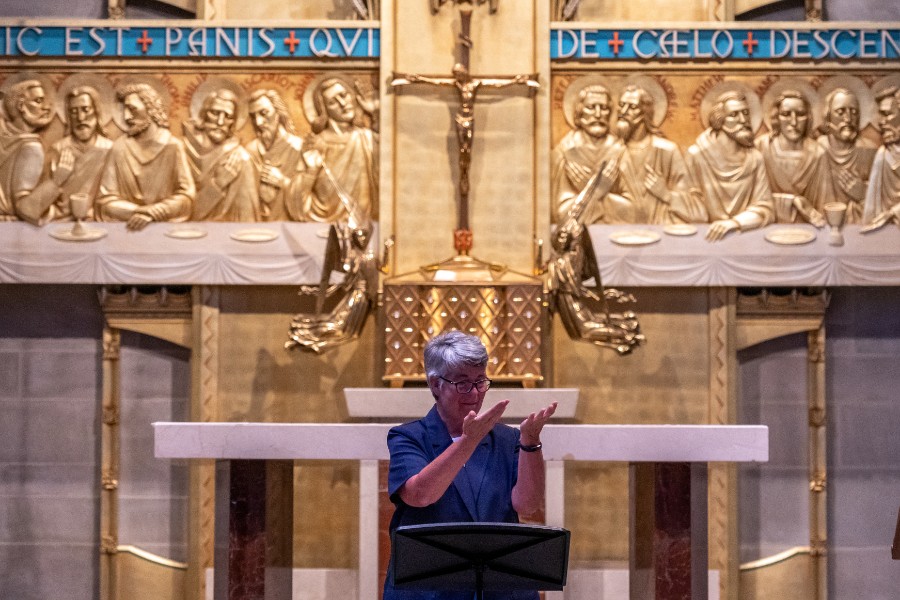
Matysek
Is it licit to go to confession to someone who doesn’t know sign language – if you can write out the confession? I don’t know if that’s allowed.
Duck
Yes, that is allowed. And some deaf people are able to feel comfortable with that and be able to go to confession to a priest who is unable to sign. The other possibility is to use an interpreter for confession, but most interpreters and most deaf people don’t feel very comfortable with that. And there’s certain amount of discomfort also in writing down sins and having them sitting there on somebody’s – you know, in writing.
Matysek
Right.
Duck
And what do you do with the paper?
Matysek
Are there parishes that offer auditory assistance? I’m thinking of headphones or things like that for people who might be hard of hearing?
Duck
That’s a very good question. There are. Like 20 percent of the population do have a hearing problem, a loss at least in one ear. And so every single parish has people who have difficulty hearing. There’s just no question about that. And then, you know, what do we do about that?
With the Americans With Disabilities Act, when a sound system is put into a public place, they are required to provide assisted listening system within that public address system. And so normally, when they do upgrade the system, if it’s an older system or if they have a new system put in, there is some sort of an assisted listening system in probably, I would guess probably almost all of the parishes in the diocese.
However, that does not mean that those assisted systems are being used. And, in my experience, in most of the parishes, they are not.
And normally what happens is the most convenient system is an FM system where they add an FM broadcast basically that is very localized to the church so that if you have the receiver, then you can listen to what is broadcast over the PA system through a receiver, which you would then use has headphones or earbuds in your ear.
However, these, although they are provided when the system is put in, in my experience, most of them are sitting in a drawer somewhere. Part of it is because they require upkeep and they require someone to take care of them. They run on a battery, the batteries have to be changed and then people are sticking these earbuds in their ears. Someone has to clean them to make sure they’re clean. Nobody takes on that responsibility.
And in addition to all of that, most people who are hard of hearing often do not like to identify themselves as hard of hearing. And so they don’t want to have to go to the usher or to the greeter and say do you have an assisted listening device that I can borrow?
And then have this thing and then have this thing sticking in their ear and having people think that maybe they’re listening to the ball game or something like this. And so it’s a stigma that is attached to using them. However, those who overcome that discomfort of being identified as using this device find them very, very useful and they can hear and understand so much more than sitting there in the pew wondering what the priest is saying.
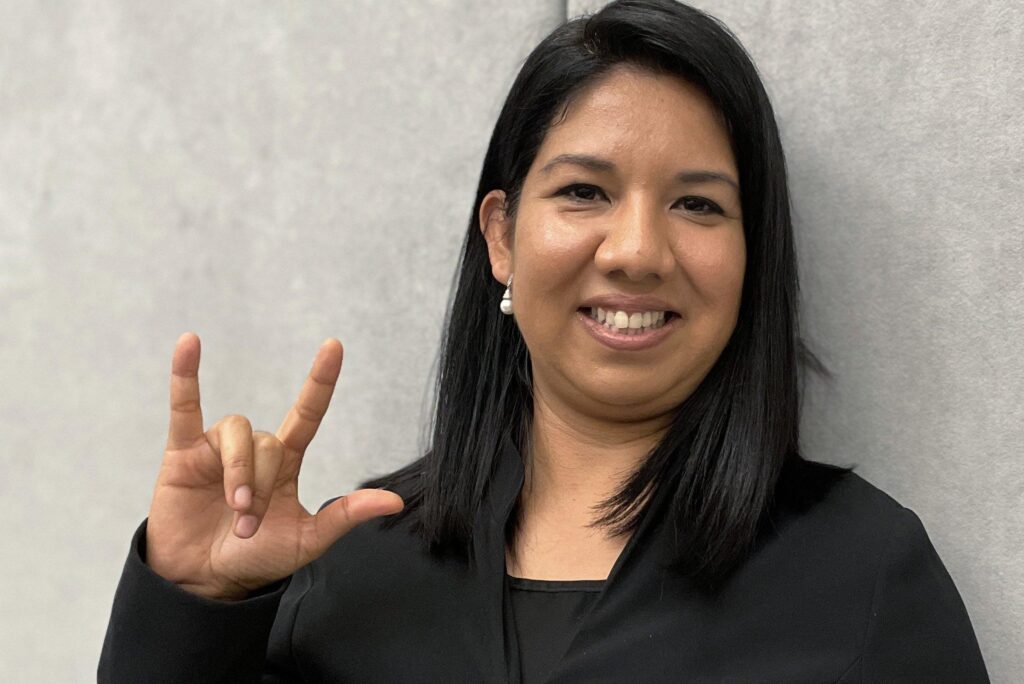
And so they’re a very valuable system. There is an alternative system which works even better and which most deaf people and hard of hearing people prefer. And that is called an auditory loop. And in that system, when they place the system in place, there is a wire that is put into the perimeter of the building either on the floor or in the ceiling. And that produces an induction field which the hearing aid can pick up. And that’s based on some old technology. Back when we had the great big heavy telephone receivers that you put up to your ear and there was a telecoil involved with that so that the hearing aid could be heard.
But anyway, that technology, even though it’s very old, is very effective because what happens is the deaf person or the hard-of-hearing person has a hearing aid which is adjusted to their own hearing loss, which is adjusted for each different frequency of how much amplification they need. And so when the hearing aid picks up this signal, it goes right through their hearing aid which is already adjusted personally to their hearing loss. And so they can also just very discreetly push a little button on their hearing aid and it switches over to take the information from the auditory loop instead of just what is being produced ambiently within the environment.
And so that produces a much better quality of hearing what’s going on within the church. However, to install an auditory loop system, there’s a larger initial expense on the part of the parish to do that.
Matysek
Well, our guest today is Christopher Duck, coordinator of deaf ministry in the Archdiocese of Baltimore. We’re going to take a little break, then we’ll come back and continue our conversation and also look a little bit at what seminaries are doing to try to prepare future priests in the area of deaf ministry.
I’m George Matysek. You’re listening to Catholic Review Radio. We’ll be back in a moment.
Commercial and news break
SEGMENT TWO
Matysek
Welcome back to Catholic Review Radio. I’m George Matysek. Our guest today is Christopher Duck, coordinator of deaf ministry in the Archdiocese of Baltimore, and we’re talking about outreach to the deaf community.
Chris, could you talk about what the archdiocese is doing in the area of training future priests, the seminarians of our archdiocese, to be aware of the deaf community and how they might serve the deaf community?
Duck
Yes. The interesting thing is that there are not a lot of deaf priests in the world. There are fewer than two dozen deaf people who are priests. And, in the United States, we have about 10 deaf priests. And so what we also need are hearing priests who are fluent in American Sign Language.
And so I have been working with the vocations department, trying to encourage them to allow the seminarians to learn American Sign Language ASL and, specifically, the archdiocese asked one of the seminarians, Luke Koski, who has now Deacon Luke, to learn sign language. He had taken a class, before he became a seminarian, in American Sign Language, and I think they picked up on that.
So for these last several years, he has been working with me and with a deaf woman on a regular basis to improve his American Sign Language skills so that he would be able to celebrate the sacraments in American Sign Language.
In addition, Father Steven Roth (vocations director) will invite me to speak to the seminarians when they get together from time to time. So I’ve had that opportunity on a couple of occasions and help them to understand what it is that is related to deafness in terms of their ministry.
And there are several other seminarians who also expressed an interest in learning American Sign Language. And so I have been working with them as well, trying to just help them learn some very basic kinds of signs. So that’s what we’re doing in terms of working with the seminarians here in this diocese. And it’s truly a great need.
Matysek
If there’s someone out there right now listening and wants to learn sign language, what kind of resources are out there or where should they go if they want to take a class?
Duck
That’s a good question. There are many options within the community. Oftentimes, I mean, for instance, there’s some at the senior center, sometimes there’s some at the community college that you can sign up for, sometimes for credit, sometimes just for enrichment. And there are other organizations within the community.
The hearing association will offer sign language classes. So within the community, there are various options. Occasionally, there will be a parish that actually asks somebody to teach a sign language class at the parish, and that has happened on several occasions.
Matysek
How did you personally become active in this ministry?
Duck
Well, I have a brother who is deaf, and my wife has a brother who is deaf. And so we have been involved with our families in terms of helping them to have access to the church. And so we have been involved with deaf ministry for many, many years and have a familiarity with what has gone on within the Archdiocese of Baltimore for many years. And so I worked personally at the Maryland School for the Deaf. And, after I retired, then I was willing to take on this position part time within the archdiocese. But I had served within the archdiocese on an advisory committee many years before that when the position for ministry with the deaf had been eliminated. And so they set up an advisory committee to try to deal with that interim time, and I was involved back then as well.
Matysek
I know it sounds like it must be really frustrating at times because you’re not only trying to minister to Catholics who are trying to receive the sacraments, but, in this time of being – this push of being missionary disciples – you’re also trying to reach out to create new disciples. And if you can’t communicate with the community, that must be a major hindrance. What kinds of things do you do there to try to evangelize in this community?
Duck
Well, this is a very interesting statistic among the deaf community, just in general. In the United States, only 1 percent of deaf people go to any church on a regular basis. And so there’s a very rich mission field there.
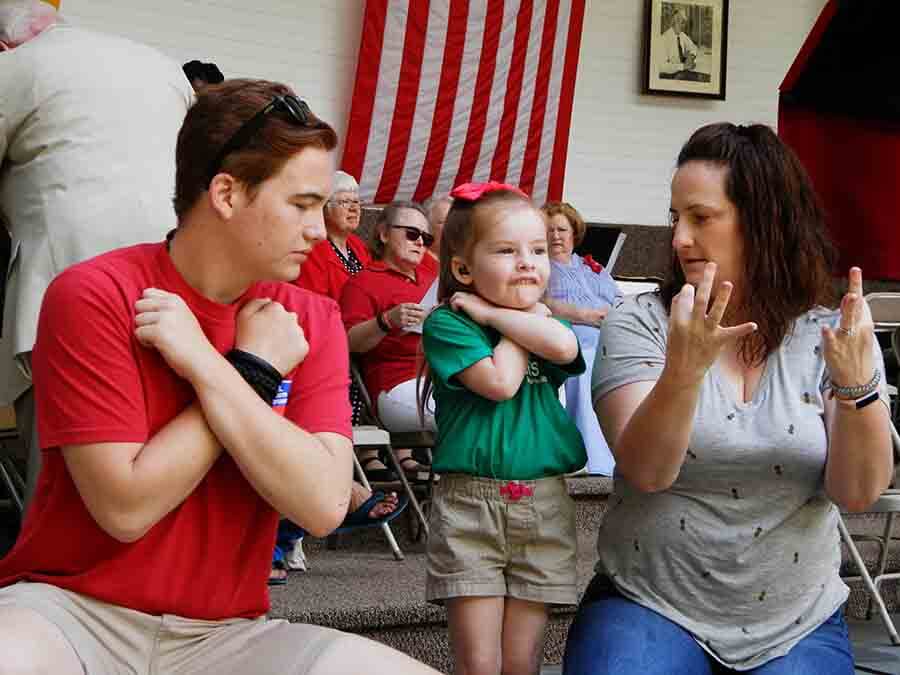
But it’s very hard to attract deaf people to attend a religious service on a regular basis if, in fact, they don’t feel welcome, they don’t feel that the Mass, the service, the program, the event is accessible to them, or there’s an effort made for them to feel involved and welcome.
And so that’s where we find the challenge because I can’t instantly produce access. We have not enough interpreters, so we are working on trying to increase the number of interpreters and come up with other solutions, like is it possible that we should be considering captioning for Mass? And then also, what can we do then to train the deaf people who are attending, in fact, to become missionary disciples?
So we’ve worked with picking several individuals to try to encourage them and sending them for special spiritual experiences that they might develop skills so that they can, in fact, reach out to other deaf people in terms of trying to evangelize.
Matysek
I know Archbishop Lori has been very intentional about making sure there are interpreters at major archdiocesan Masses. In fact, I think you are frequently the person who is interpreting at Chrism Masses and other things, is that right?
Duck
That’s true, yeah. Ordinations and the Chrism Mass and other big archdiocesan events, we do try to make sure that there is an interpreter present just so that everybody recognizes that we need to do this and that, in fact, those events are accessible to those who are deaf.
Matysek
Do you find that when there is an interpreter present, that more people from the deaf community come forward for the Mass?
Duck
Most definitely. I mean, if there’s not an interpreter present, why would they go? But, yes. But that does not mean every single time that there is an interpreter present, I’ve noticed that there is a deaf person. It really will depend. I mean, the same would be true of any person in any particular parish. Well, will they go to an RCIA event? They may or they may not, but from all over the archdiocese. But percentage-wise, the number of deaf people who are involved is much less. So, you know, sometimes they’re there, sometimes they’re not.
Matysek
Do you have any tips for parishes on ways they can make their communities more welcoming?
Duck
Well, the first thing is to not feel that they are cut off and that they can’t communicate. I mean, yes, you may not know American Sign Language, but you certainly can have a friendly face and you certainly can say hello and make somebody feel welcome. And that is, I think, the most important thing, especially if your parish does have an interpreter, many people feel like, well, I can’t communicate with that person who is deaf, who is attending, because I don’t know American Sign Language. And to some degree there’s truth in that. But that doesn’t mean you can’t make them feel welcome.
Matysek
How can people get more information about deaf ministry? Or how can they reach you?
Duck
Well, they certainly can reach me at the Catholic Center. My email address is Chris.Duck@archbalt.org. And also the phone number there at my office is 410-547-4194. 410-547-5419.
Matysek
Great! Well, our guest today has been Christopher Duck, coordinator of deaf ministry in the Archdiocese of Baltimore. Chris, thanks so much for being here.
Duck
You’re welcome.
Matysek
For Catholic Review Radio, I’m George Matysek. Thanks for listening.
Commercials
— End —
Email George Matysek at gmatysek@CatholicReview.org
Copyright © 2022 Catholic Review Media
